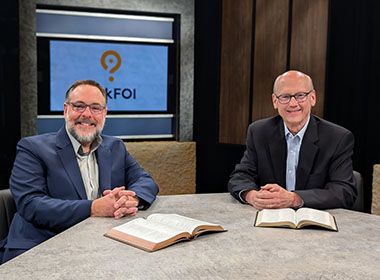Inside View Jan/Feb 2025
I once read that the greatest threat to any organization is leadership succession. This statement rings especially true of Christian organizations. In ministry, selecting a new leader often is treated like a brief courtship because someone who makes a good first impression but is not well known usually is chosen. Appointing the right leader is crucial because organizations rise and fall on leadership.
The Word of God teaches much about leadership succession. While there is no one-size-fits-all approach, many important accounts in Scripture form a pattern of identifying successors, training them in the ministry, developing them as leaders, and transitioning them into their new roles.
For example, Joshua served as Moses’ right-hand man for many years until Moses’ death; and God promoted Joshua to guide Israel into the Promised Land.
Samuel was designated at a young age to learn the ways of the priests and prophets. In time, the Israelites revered him as an authoritative prophet.
David was anointed about 15 years before becoming the king of Israel. God placed him in Saul’s court to teach David how Israel’s king functioned and handled challenges. The Lord gave David a group of faithful men to develop his skills and prepare him to lead the nation.
Elisha shadowed the prophet Elijah for years before competently stepping into his mentor’s position as Israel’s prophet when Elijah ascended to heaven.
Jesus chose 12 men and spent three years discipling them, teaching them, and giving them assignments to develop their skills and experience. When Jesus departed, God used them (all except Judas Iscariot) to bring thousands to faith and shepherd the early church by the Holy Spirit’s power.
The apostle Paul raised up many leaders in the quickly expanding church by selecting and training godly men. Timothy, Titus, and John Mark eventually rose to positions of church leadership, serving alongside Paul and gleaning from him. Paul encouraged them, “The things that you have heard from me among many witnesses, commit these to faithful men who will be able to teach others also” (2 Tim. 2:2).
Common to all of these examples is the time these leaders spent learning their ministries and proving their worth before being elevated to positions of leadership. They were not introduced as unfamiliar outsiders.
The Friends of Israel Gospel Ministry (FOI) historically has followed this model by selecting and developing leaders from within our ministry. Each of the five executive directors in FOI’s 86 years was well known before his appointment, a practice that has proven successful.

In 2024, having served as FOI’s executive director and president for the past 12 years, I began working with our Board of Trustees to select and transition the next man of God to lead The Friends of Israel. While I will remain as president and chief executive officer of the ministry for a time, I am delighted to share with you that the Board has appointed Steve Conover as our next executive director, effective January 1, 2025. As executive director, Steve will handle the daily operations of the ministry, which today comprises 125 employees in 13 countries and an extensive volunteer network.
Steve has served faithfully with FOI for 30 years and has led our Media Ministries for the past 18 years, most recently as the department’s vice president. Steve has grown into a skilled leader who knows our ministry well. The Lord positioned him to work directly with each of the past three executive directors: Elwood McQuaid, Bill Sutter, and me. For the past eight years, he has assisted me as executive vice president. God certainly has gifted and prepared Steve for this vital role.
Please pray that God will use Steve for His glory and prosper The Friends of Israel Gospel Ministry under his leadership.
Photo: The Friends of Israel Archives









Praying for both of you.